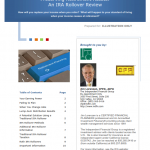
Planning to Roll Your 401(k) to Your Own IRA?
Jim Lorenzen, CFP®, AIF® Getting ready to retire? Planning to roll your 401(k) into your own IRA? It will pay to do your homework first.

Jim Lorenzen, CFP®, AIF® Getting ready to retire? Planning to roll your 401(k) into your own IRA? It will pay to do your homework first.

Jim Lorenzen, CFP®, AIF® This past Monday, I retweeted a Fox Business post, Why Your Retirement Savings May Be a Pipedream. A number of my

Jim Lorenzen, CFP®, AIF® Executive Bonus plans are a little different from Non-Qualified Deferred Compensation Plans (NQDC), which we talked about in another short paper.

Jim Lorenzen, CFP®, AIF® Tax-deferred and tax-advantaged are two termsoften used interchangeably and, as a result, often lead to a lot of confusion; but, the

Jim Lorenzen, CFP®, AIF® Getting ready to pull the retirement cord? In a previouspost, I had talked about pension options – worth reviewing if that’s

Jim Lorenzen, CFP®, AIF® Getting ready to leave your company? Considering doing a rollover? This isn’t a decision to be taken lightly. While rolling over

Jim Lorenzen, CFP®, AIF® The Society of Actuaries outlined 17 unexpected or shocking expenses during retirement in its 2015 Risks and Process of Retirement Survey.

Jim Lorenzen, CFP®, AIF® Many years ago a prospective client told me his investment returnshad averaged 25% per year over the past ten years. This

Jim Lorenzen, CFP®, AIF® According to a survey conducted by Bankers Life Center for a Secure Retirement, middle income boomers aren’t paying much attention to

I’ll be conducting a retirement webinar this comingSaturday, October 1st. Who would benefit: “Baby Boomers” planning for or nearing retirement and desiring to put a
If you have $500,000 in your 401(k) or IRA, it’s not really $500.000. That’s a tax planning mistake most people make going right out of the gate. If you’re married and filing jointly, it’s more likely you could have $325,000 (35% tax bracket) or just $315,000 (37% tax bracket).
The three largest expenses in the federal budget are Social Security/Medicare, interest on the debt, and defense.